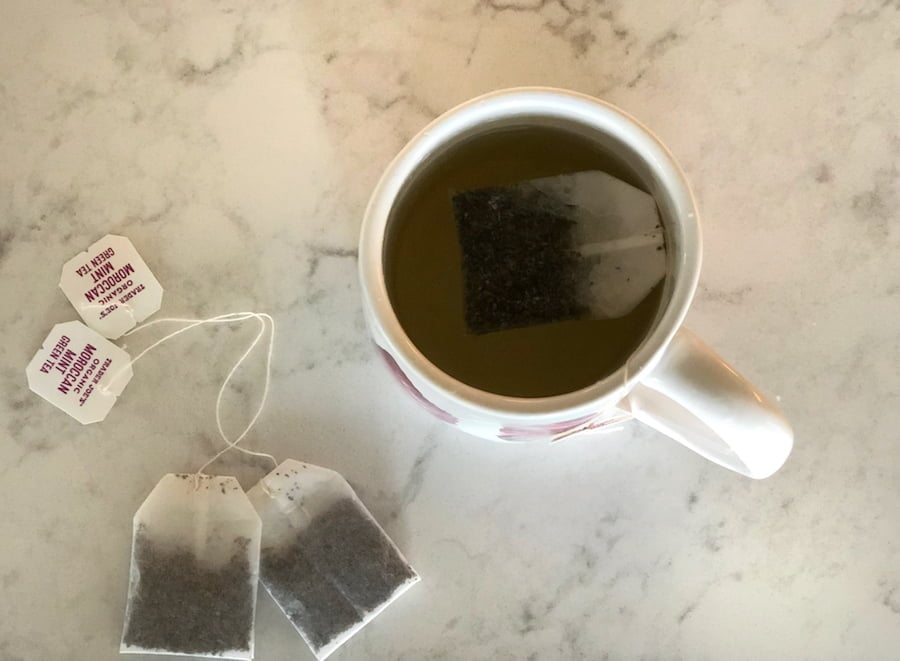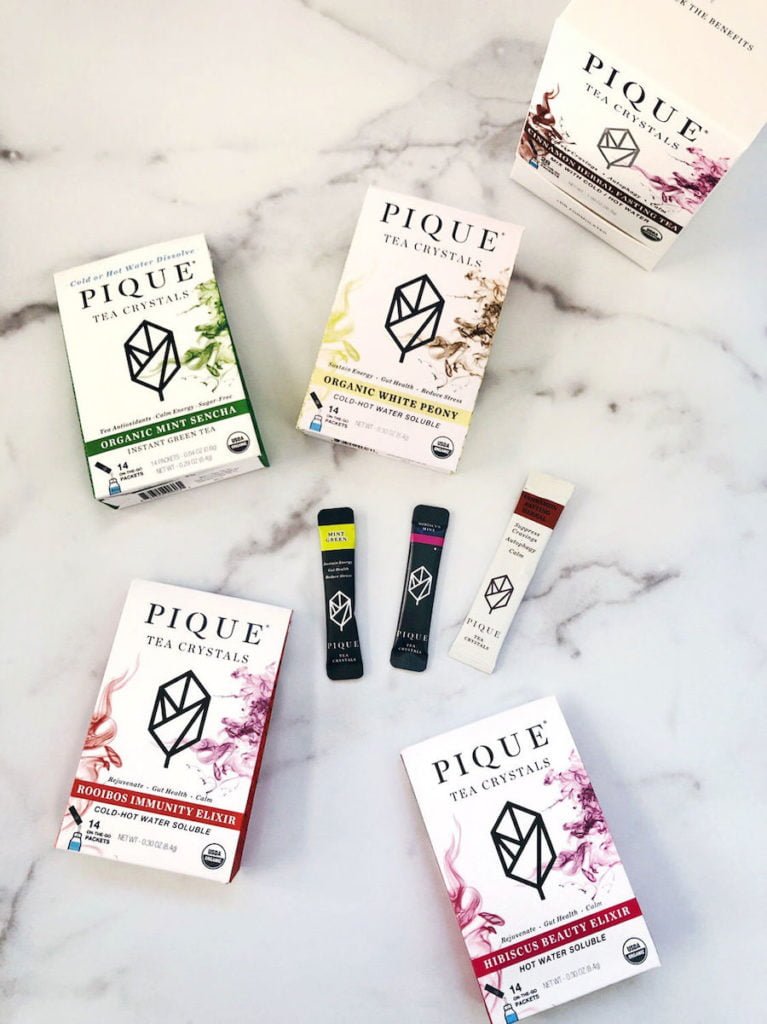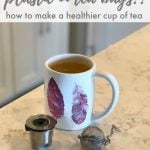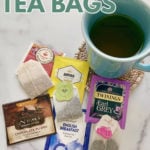Plastic in Tea Bags (and the brands that don’t contain it)
A spot of tea… And some plastic? You’d probably be surprised to learn that most tea bags contain up to 25% plastic. In fact, we didn’t know about plastic in tea bags until we watched a viral BBC video about tea production in 2017.
Hot food or beverages and plastic don’t mix. Heat can cause the chemicals from plastic to leach into your food or drink, releasing carcinogens and endocrine disruptors.
Canadian researchers published a study in the American Chemical Society’s Journal of Environmental Science and Technology which found that steeping a single plastic tea bag at brewing temperature releases about 11.6 billion minuscule particles known as “microplastics” and 3.1 billion “nanoplastics” into each cup (source).
“We think that it is a lot when compared to other foods that contain microplastics,” Nathalie Tufenkji of McGill University in Quebec, told The New Scientist. “Table salt, which has a relatively high microplastic content, has been reported to contain approximately 0.005 micrograms plastic per gram salt. A cup of tea contains thousands of times greater mass of plastic, at 16 micrograms per cup.”
When you look at a tea bag, plastic usually isn’t the first thing that comes to mind. Yet about a quarter of each tea bag (from most brands) is comprised of this substance. You can watch how tea bags made (see it here) to see how plastic is incorporated.
Why Is Plastic in Tea Bags?
It may be hard to believe, but most brands of bagged tea contain plastic. With millions upon millions of cups consumed daily, this adds up to a lot of plastic.
So why is plastic in tea bags to begin with?
In order for the tea bags to seal up and keep their shape in hot liquid, a plastic polymer, namely polypropylene, must be added. Even though the amounts of plastic found in tea bags is minimal — and vary between manufacturers — it adds up to quite a bit when you look at the big picture.
Due to the plastic content, conventional tea bags cannot completely decompose. This makes them a bad option for compost material and the environment… not to mention your body!
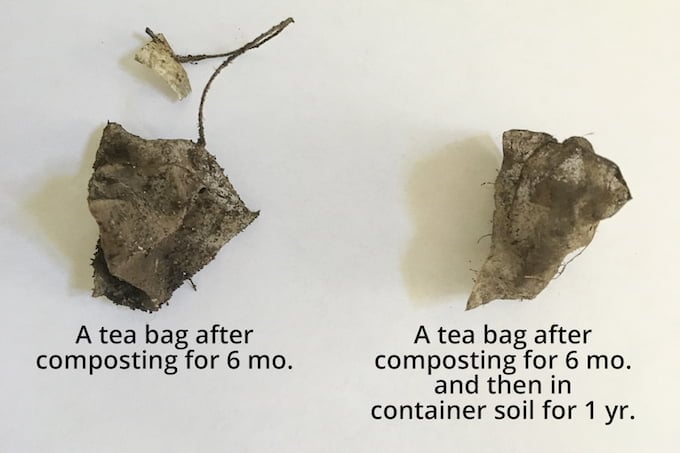
Like most plastics, polypropylene is known to adversely affect the body’s endocrine system (source). And as we’ve covered many times, endocrine disruptors can lead to a plethora of health issues and other maladies that can become chronic conditions (source).
One would think making the switch to plastic-free tea bags would be easy, but many tea manufacturers protest that non-plastic bags would be too costly to implement.
How to Avoid Plastic in Tea Bags
Although some of the bigger tea brands seem hesitant to make the switch to plastic-free bags, you don’t have to wait to start drinking tea without microplastics.
Many tea bags are made from paper that has been sealed with a plastic sealant. These are less of a health risk than the usually pyramid-shaped tea bags, which are usually made entirely from plastic.
You can choose brands that don’t use bisphenol-A (BPA), phthalates, or polypropylene. Other great options are tea bags made from organic cotton, hemp, or certain plant fibers.
One more concern to be aware of is PFAS (Per-and polyfluoroalkyl substances also known as “forever chemicals”). Much more research is needed on these, but here is helpful advice on avoiding PFAS in tea bags.
Plastic Free Tea Bags by Brand
Further down, you’ll see other fool proof options like loose leaf tea. Personally, I use loose leaf most of the time, but tea bags are more convenient for travel and days I need to leave the house in a hurry.
So, after reaching out to several brands and receiving emails once they saw this article, we created a list of brands that have confirmed they do not use plastic in their string-and-tag teabags.
Bromley – Their teabag paper is made from wood pulp. They are heat sealed together without using glue. They do not contain any plastics of any kind (including no PLA) and are completely compostable.
Earth Mama Organics – Their team responded to our email request with this information, “Our tea bags are made from wood pulp and abaca with just enough thermoplastic fibers to make sure they stay closed. Because all of Earth Mama’s teas are 100% USDA Certified Organic, this includes the paper tea bags, which are not processed with chlorine, dioxins, and/or epichlorohydrin. They have been analyzed and approved for Non-GMO Project Verified status.”
Lyon’s – Their teabags are now made from a blend of natural fibers – abaca and cellulose fibers. They do not use PLA in their teabags.
The company stated, “Our commitment to sustainability is paramount, and we are constantly seeking ways to minimize our impact on the environment. Our biodegradable teabags are designed to break down naturally in composting conditions, leaving no harmful residues. We have also eliminated the use of staples and glue in our teabags to make them even more eco-friendly.”
Nature’s Cuppa – Australia-based manufacturer stated that their tea bags are made with unbleached paper with no polymers, nor plasticizers. They do not contain plastic or PLA.
Numi Organic Tea – Numi does not use plastic or PLA. “We’ve been concerned about the potential health risks of steeping chemicals in hot water since day one,” explained Ahmed Rahim, CEO and co-founder. “We use biodegradable, unbleached Manila hemp fiber for our tea bags. They are Non-GMO verified and will degrade over time in a normal compost heap.”
Pukka Herb teas – No plastic or PLA is used in Pukka’s tea bags. Their website states: “We use a simple stitch of organic cotton and a unique folding process. This means we don’t need to use polypropylene to hold our teabags together and our teabags are free from plastic. We were the first company to ever use organic strings to hold our teabags together without the need of a metal staple or polypropylene.”
Red Rose Tea – We reached out to their customer service team in January of 2025 and received this response: “Please be advised that the tea bags are made from abaca fiber which is an alternative to using polymer material. All materials used in our tea bags meet FDA safety standards.”
We also asked about any sealants they use, and they said, “The inner seam that you see which is white, is pressured sealed so there are no glue or plastics involved to seal our teabags.”
Republic of Tea – “Teabags from The Republic of Tea come in our signature unbleached round paper teabags with no unnecessary strings, tags, or staples. The Republic of Tea does not make nylon or silken tea bags.”
Stash Tea – They do not use plastic or PLA in their tea bags. Their website indicates: “Our tea bags are free of plastics and made from sustainable, unbleached natural fiber and GMO-free cotton string.”
Traditional Medicinals – If you rely on their Throat Coat tea during allergy season like I do, you’ll be happy to know their bags don’t contain plastic.
They report: “For three decades, our tea bags have been made especially for us from sustainably farmed abacá leaf fiber, grown in the Philippines by empowered cooperatives of small-production family farmers. Our non-GMO tea bags are made from sustainably harvested abacá (Musa textilis) fiber, which is also known as manila hemp, even though it is actually a species of banana, and FSC-certified wood pulp.” (source)
PLA Tea Bags by Brand
Many brands that were using petroleum based plastic have transitioned to polylactic acid (PLA) so they can claim to be “plastic free”. PLA is a plant-based polymer (sometimes referred to as a bioplastic). It is biodegradable, and appears to be better for the environment.
Teabags mostly made of cellulose or cellulose blended with a bioplastic present in a smaller ratio, are a better alternative to petroleum-based or pure PLA plastics, in terms of rapid environmental degradation.
But the health of the environment and the health of your body are two different considerations.
Plant material sources include corn starch, which can come from genetically modified (GM) maize. So that can’t be used in brands labeled as organic teabags.
This kind of murky area is why I choose loose leaf tea at home and try to bring or buy the above options for travel.
That said, the following brands have confirmed their use of PLA, which is a better alternative to the pyramid shaped plastic bags:
Aldi – In June 2021, Aldi confirmed they were removing single-use plastic from their brand range of teabags. Now all of Aldi’s own brand tea – including decaffeinated, and fruit and herbal infusions are made from PLA.
Clipper Tea – They announced in 2018, “We are so proud to have launched the world’s first plastic-free, unbleached and non-GM pillow tea bags.” They updated their statement in 2020 to explain, “We were the World’s 1st tea company to make ALL our heat seal teabags, unbleached, non-GM plant-based & fully biodegradable. When we said plastic-free teabags, we meant our tea bags are free from polypropylene otherwise known as petro or oil based or fossil fuel based plastic.”
They now go on to explain, “Clipper teabags are sealed with a non-GM bio-material made from plant cellulose, known as PLA, also known as bio-plastic. PLA is made from bio material, is fully biodegradable and nothing like the damaging oil-based plastics that people are rightfully concerned about. Now in 2020, the regulations about PLA have changed and all the tea companies are going to talk about PLA as plant-based and biodegradable, rather than plastic-free.”
PG Tips – Following consumer pressure in 2018, PG Tips announced it was going ‘plastic-free’ for its pyramid bags, with the rest of its teabags following that. Now they report, “Our biodegradable teabags are made from PLA which is a material derived from corn, grown in the US. Current US corn growing practices produce a mixed stream of GM and conventional (non-GM) corn. However, the processing and manufacturing process uses a high heat process, and no detectable GM material remains. Longer term, we are working with our supplier on the development of biodegradable teabags from other sources that are non-GMO crops.”
Taylors / Yorkshire – of Harrogate Tea and Yorkshire Tea are part of the same brand. As of September 2021, they announced a transition away from plastic and into plant based PLA.
According to Taylors website, their bag paper is “interwoven with a plastic web, which can be very quickly heated at the edges of the bag to seal it all together. Traditionally this plastic has been oil-based (polypropylene) and our new tea bags use plant-based plastic instead (PLA).”
Teapigs tea bags are made with PLA. Their website states: “Our tea temples are made from corn starch, the tags on the end of the string are made from paper, and everything is heat sealed together – we never use glues. The tea temples are 100% biodegradable and commercially compostable but we do not recommend that you attempt to compost them in your garden – they need more heat and micro-organisms than your home compost will be able to deliver.”
Tielka – “Tielka tea bags and pouches are made from GMO-free, plastic-free, bio-renewable material (PLA bio-plastic). Tielka individually wrapped tea bags are wrapped in PE foil. Current technology does not allow for a plastic-free alternative for this wrapping.” In 2017, Tielka started packaging their Fair Trade teas in a plant-based tea bag fabric that comes from a sustainable, bio-renewable source. According to their site, “We also opted not to seal our tea bags with harmful glue, but by ultrasound.”
Twinings – Twinnings uses PLA in their teabags. “Our premium hot and cold ‘mesh’ tea bags look as though they are made from plastic, but this is actually a corn-starch derived material that will also degrade when industrially composted. We are also working to transition our inner wrappers to a material that is fully recyclable. Furthermore, our new and innovative Cold Infuse product range is currently packed in a fully recyclable plastic jar. Both the lid and the jar are recyclable, and we currently have a project underway to review what alternative materials we could use to make this product even more sustainable.”
Does PLA Release Microplastics?
Researchers are still working to understand the full picture. PLA bioplastics were initially marketed as a more sustainable alternative to traditional plastics, with the claim that they don’t break down into persistent microplastics. (source)
However, recent studies suggest there’s more to consider.
For instance, a study published in Environmental Pollution in December 2024 explores the toxicological effects of PLA’s biodegradation.
Another study from April 2024, published in Science of the Total Environment, highlights the need for further research to determine any potential health risks from exposure to PLA.
Adding to the discussion, a July 2024 study (also in Science of the Total Environment) examined three different cellulose/PLA tea bag brands. It found significant differences in how they decomposed, their environmental impact, and even their effects on earthworm reproduction. The research also pointed to previous findings that PLA doesn’t always fully break down in composting facilities. This makes it more likely to cause microplastic pollution in the environment.
Plant based “plastics” might remind you of the trend away from plastic sippy cups to BPA-free when we weren’t fully knowledgable of the safety of the new (and still plastic) cups.
Other Ways to Avoid Plastic in Tea
If you’re still worried about PLA or what exactly a brand means by plastic-free tea bags, choose an option that doesn’t allow for hot water to make contact with anything but the tea leaves themselves.
Choose Loose Leaf Tea
If you’ve used bagged tea because you thought loose leaf was too much trouble, you’re in for a pleasant surprise. Organic loose leaf tea can be made just as conveniently. And it’s typically more flavorful because the tea leaves haven’t been ground to dust to fit into a tiny plastic-riddled tea bag!
Many organic loose leaf tea brands come in easy to store tins or eco-friendly packaging.
Good Earth
Lunar Herbals – our team loves their Calm Nerves tea!
Numi Organic Loose Leaf Tea
Tea Forte Organic Loose Leaf
Golden Moon Organic Tea
The Tao of Tea
Firebelly Tea
Mountain Rose Herbs Teas
Golden Wattle Tea (Australia)
Loose leaf tea is a more economical choice since it is priced by weight, while tea bags are priced per bag. You can also reuse loose leaf tea to make a second cup to cut expenses and waste.
And you can buy loose leaf tea in bulk. This involves as little waste and plastic contamination as possible. Loose leaf tea can also be purchased in cans or boxes if bulk is not an option for you.
You can also grow tea leaves yourself. Some of the herbs used to make tea are fairly easy to care for. Knowing where your tea leaves came from can give you extra peace of mind. I started growing cranberry hibiscus in one of my raised garden beds. I now have enough leaves to dry and make tea for the next three years!
How to Brew Loose Leaf Tea Without Plastic
There are plenty of simple ways to avoid plastic tea bags.
One way that doesn’t require any new kitchen gadgets is to boil water on the stove top and pour it into a mug of loose leaf tea. If you don’t want to drink tea leaves, strain it with a piece of cheese cloth you can wash and reuse.
A stainless steel tea infuser eliminates plastic contamination and the need for straining. I prefer one like this that balances on the sides of your tea cup or mug. Pour hot water into a tea mug and steep with loose leaf tea in the infuser for 3 to 5 minutes.
This glass tea kettle comes with a stainless steel infuser. We add filtered water, turn on the gas stove, and add two teaspoons of loose leaf tea to the infuser as the water is heating. The process takes about 7 minutes from start to simmering.
For Keurig users – Instead of buying single-use pods (10 billion of them end up in landfills each year) to brew tea in your Keurig, get a stainless steel refillable pod to use again and again. Simply scoop about two teaspoons of loose leaf tea (or coffee) into the pod and use your Keurig as usual. One of the Green Child team members used the same stainless cup for 8 years and it’s still in perfect condition.
Try Tea Crystals
You can skip the brewing process altogether with Pique Tea crystals (find them at Pique’s website or on Amazon). Mix them in either cold or hot water – and watch them dissolve with no tea bag required – for a delicious tea that is loaded with beneficial polyphenols.
Pique comes in a cardboard box that contains small plastic packets of tea crystals. You pour the tea crystals out of the packet, so heat and plastic are never combined. It’s kind of like some non-plastic tea bags that are packaged in a plastic sleeve (that you also throw away before using). If you’re trying to eliminate single-use plastic, then you’d want to go with all-paper options or loose leaf tea.
Their unique teas are composed of supercharged 100% organic tea crystals, which are Cold Brew Crystallized, meaning they deliver maximum antioxidant capacity – 6x the antioxidants of tea bags and 20x the antioxidants of bottled tea. Plus you’ll find no preservatives, sugar, or additives in these little packets.
Tea crystals from Pique are concentrated and deliver 12X the antioxidants of other teas. Plus Pique triple screens for pesticides, heavy metals, and mold.
There are plenty of options that can give you the tea you love while also protecting the environment and your health. That way you can enjoy the numerous health benefits of tea without any of the side effects of plastic.
You might also enjoy these articles:
The problem with single-use plastic and how you can avoid it
The health benefits of matcha tea
The 15 most important steps to go green
This article was originally published in June 2018 and updated in March 2025.

